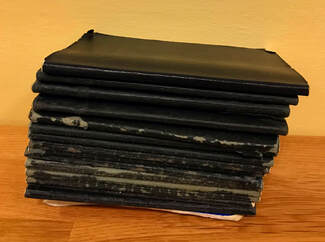Silver Wordsmith: An author's journey |
 Personify your fears so you have something you can picture when you’re curled up in a little ball and feeling like a complete failure. Photo credit: Tim Ellis on VisualHunt.com / CC BY-NC Personify your fears so you have something you can picture when you’re curled up in a little ball and feeling like a complete failure. Photo credit: Tim Ellis on VisualHunt.com / CC BY-NC
Despite having written for a long time, half my current struggle is not my writing itself but rather how I write. The most recent battle has involved starting my next novel project. My first and currently incomplete novel had finished its first draft stage two years ago. Since then, it has undergone one massive revision and is currently going through its second one. Editing is its own kind of challenge and reward but it isn’t as fulfilling to me as putting new words on paper.
I have been able to satisfy my appetite with a few short stories in the meantime, but I’m feeling about ready to launch into a new novel, and have spent months failing miserably at it. There’s close to a dozen ideas I’m itching to rip into, but I also have the approximate confidence of a field mouse staring down a parliament of owls. ​So what’s the problem? And I mean, other than the fact that I think my plots are a snooze-fest, my characters are flat and my prose is self-indulgent? Well, the problem is that in my mind none of those novels feel like they exist. I see them as nebulas floating in the cavernous universe of my mind, and once I try to distill them into something tangible I get a few drops, not the roaring hot ball of a star. The answer, according to my epiphany which like many of my epiphanies may turn out to be an episode of self-delusion, is outlining. I can’t not outline. And I hate it.
The answer, according to my epiphany which like many of my epiphanies may turn out to be an episode of self-delusion, is outlining. I can’t not outline. And I hate it.
But why hate it? Because like any writer, my mind latches on only to such evidence that can be used against me at times of insecurity. Take the following tweet from one of my most admired writers, J. Michael Straczynski, who played no small part in my childhood as the creator of Babylon 5 (seriously, free up your whole week and enjoy the ride if you can get your hands on this show):
 My pride and, apparently, my shame. My pride and, apparently, my shame.
Now here’s someone who has come up with one of the most brilliant multi-season arcs of a TV show telling me he avoids outlining because his characters act on their own accord. In my situation, on the other hand, I feel like my characters are comatose unless the plot drags them kicking and screaming into doing something interesting. And then there’s an uplifting post on the New York Book Editors blog which gut punches you by telling you that “planning your novel ahead of time increases its likelihood of being dead on arrival†and that “the less you know before you start, the more you stand to uncover as you write.†So great, if I choose to outline, my novel will likely be a predictable limp fish that will likely be euthanized by discerning publishers. And then there’s the description of “Macro Planners†by Orange Prize winning author Zadie Smith, who says you will recognizes a writer who plans and outlines excessively “from those Moleskines he insists on buyingâ€. This seems needlessly personal: ​ So now that I’ve been officially relegated to a walking stereotype, why continue to rely on outlines? I certainly see merit in the argument that a robust outline takes some of the magic out of it – once plot elements and characterization has been summed up in bullet point form, it might feel like there’s nothing left to the process. Neil D’Silva went so far as to say that outlining “makes the writing formulaic and there’s no adventure left in it for me†So why do I insist on it?  Outlines and skeletons are similar in that they are both spooky as fuck. Photo Credit: Johnson Cameraface on Visualhunt / CC BY-NC-SA Outlines and skeletons are similar in that they are both spooky as fuck. Photo Credit: Johnson Cameraface on Visualhunt / CC BY-NC-SA
Because I’m not sure if I’m able to write any other way. Let’s take my first novel for example. When I first starting putting it to paper, I set out to write a longish short story. About 8,000 words in, and having barely scratched the surface of the plot, I found myself staring at a project I hadn’t anticipated. It grew in spurts and starts, climbing approximately to 25,000 over the course of the next four years. Not exactly the most efficient pace, is it?
And then, I decided to outline the whole sucker. I spent a few brainstorming sessions laying out the chapters, arriving at approximately 20, with a whole fleshed-out paragraph for what was going to happen in that chapter. And that’s when the ball started really rolling. I was able to focus on my present writing but keeping an eye to the future and the past. Sometimes when I was stuck on a current chapter, but inspiration struck for a later scene, I would skip ahead and start writing that out. It was great insurance against writers block. I had reworked my initial summary significantly, but I feel like that’s what really got me to the finish line. But that was just my first novel, right? Amateurish stuff where crutches are needed before I could learn how to be a proper writer? That’s what I assumed. So for my next project, I took an idea that had been percolating in my head for years – I had a vague plot outline for the work but it was entirely in my head. I thought it would be a great start. Over 5,000 words in and I’m convinced it needs to be burned with fire. Nothing has happened, the plot has barely trudged forward, and I personally want to strangle the main character to death. But maybe I haven’t gotten deep enough. Maybe the issue is I had that outline in my head and it’s stifling my creativity. So I tried again from scratch. Now I took something that was only formulated as a vague idea and I was about to write it furiously. I stared at the page for a half hour. Nothing happened. Then I tried with a different idea, and nothing happened. So what the hell? As writers, we’re all different, and we need to embrace those difference. Forget the hard and fast rules. The same Book Editors of New York piece also concedes that if outlines help get you started, you should keep them. And I think that part is key. The outline may be the skeleton of the work but the work itself should be organic. It should be a living creature that changes and evolves into something new. It could be a caterpillar that transforms into a butterfly but the blueprint for that butterfly was still contained in the caterpillar. I will probably share my exact outlining process in a later blog post, but I can already tell you these can come in various shapes and sizes. You can have a sheet full of bullet points that just keeps you on track. Or something that follows the rise and fall of all the plotlines to ensure they’re tied together. Or you can have an outline that sketches out the structure of the finished work in a very technical sense – a breakdown between three Acts, each occupying a certain percentage of the work (often 25/50/25), a major inciting incident, and the elegant sinusoidal curve of action that alternates between successes and failures. ​ A lot of great works can be broken down into this kind of structure, but then you’re faced with a chicken or egg problem – did we distill the structure out of great works with effective plot, or was there some kind of conscious or semi-conscious effort on the part of the authors to get their works there? The important lesson I had to learn with outlines is that’s it’s okay to rely on them. And it’s okay to wing it. It’s okay to be the writer you’re comfortable with being, because in that blanket of comfort is where your creativity will flourish.
0 Comments
Leave a Reply. |
Michael SerebriakovMichael is a husband, father of three, lawyer, writer, and looking for that first big leap into publishing. All opinions are author's own. StoriesUrsa Major Categories
All
Archives
January 2024
|
Proudly powered by Weebly
 RSS Feed
RSS Feed